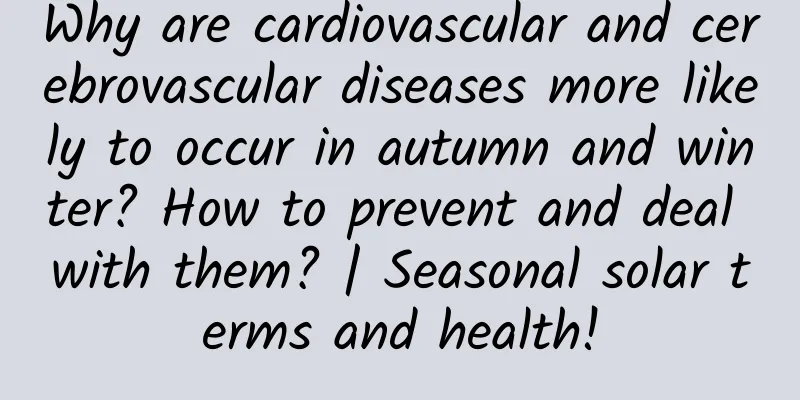Why are cardiovascular and cerebrovascular diseases more likely to occur in autumn and winter? How to prevent and deal with them? | Seasonal solar terms and health!

|
The number of patients with cardiovascular and cerebrovascular diseases begins to increase after the autumnal equinox. Why are cardiovascular and cerebrovascular diseases more likely to occur in autumn and winter? What are the common cardiovascular and cerebrovascular diseases? How to prevent the occurrence of cardiovascular and cerebrovascular diseases? After the autumnal equinox, the temperature difference between day and night increases and the temperature gradually drops. The drop in temperature, especially the stimulation of cold air, will cause blood vessels to constrict, increase the burden on the heart, cause high blood pressure and blood vessel blockage, and increase the risk of cardiovascular and cerebrovascular diseases. In seasons when the temperature drops, people tend to consume more high-calorie foods, which may cause increased cholesterol and blood lipids, and also increase the incidence of cardiovascular and cerebrovascular diseases. At the same time, after the autumnal equinox, the days in the northern hemisphere become shorter and the nights longer, and the sunshine time decreases, which can affect people's emotions. Emotional fluctuations are also a risk factor for cardiovascular and cerebrovascular diseases. Common cardiovascular and cerebrovascular diseases include: cerebral infarction, cerebral hemorrhage, myocardial infarction, unstable angina, etc. Therefore, during the autumnal equinox, we should first keep warm and avoid prolonged exposure to low temperatures and cold environments. Second, we should have a balanced diet, advocate less salt, less oil, and less sugar, pay attention to dietary diversification, and consume no more than one fist-sized piece of meat, two fist-sized pieces of staple food, three fist-sized pieces of fruit, and four fist-sized pieces of vegetables every day. Third, we should exercise moderately, such as walking and practicing Tai Chi, to promote blood circulation. Fourth, we should maintain a good attitude and avoid emotional fluctuations. Fifth, we should regularly monitor blood pressure, blood lipids, blood sugar and other indicators, especially patients with abnormal blood pressure, blood lipids, and blood sugar in the past. If there is a significant fluctuation, seek medical attention in time. Cerebrovascular accidents are generally more dangerous. How can the public identify them? What should we do after a sudden cerebrovascular accident? Who is more likely to have a cerebrovascular accident? How can we prevent it? △Ji Xunming, academician of the Chinese Academy of Engineering and chief physician of Xuanwu Hospital of Capital Medical University Cerebrovascular accident, also known as stroke, is an acute cerebrovascular disease, mainly ischemic stroke. Treating stroke is like a race against time. Early detection and rapid first aid are crucial and can effectively improve the success rate of rescue, reduce mortality and disability rates, and reduce complications. To identify typical symptoms of stroke, please remember the "120" formula. "1" refers to looking at a face, that is, to see if his facial lines are symmetrical. Some people will have asymmetry on both sides of the mouth or shallow facial lines on one side. "2" refers to both arms or legs, to see if he walks unsteadily or if one arm is weak. "0" refers to listening, that is, to see if he speaks incoherently. Once any of the above symptoms occur, the patient and his family should immediately call 120 emergency number and send the patient to a hospital with treatment capabilities as soon as possible. At present, most hospitals have established green channels for stroke treatment, which can effectively treat stroke patients. Before waiting for the ambulance to arrive, avoid several mistakes: First, others should not move the patient at will, do not shake or stimulate him; second, do not shout loudly, which will make the patient nervous, which will increase his blood pressure and cause more serious problems; third, do not give medicine or food. Many stroke patients have long-term blood pressure, blood sugar, and blood lipids that have not been effectively controlled, or have not taken medicine as prescribed by the doctor. Giving them antihypertensive drugs, aspirin, etc. at this time will affect treatment. Risk factors for stroke include: high blood pressure, high blood lipids, diabetes, obesity, abnormal heart rhythm (atrial fibrillation), coronary heart disease, family history of stroke, smoking, alcoholism and other unhealthy lifestyles. People who have one or more of the above risk factors, a history of stroke, or transient cerebral ischemia are at high risk of stroke. Stroke is a preventable and curable disease. We should develop a healthy lifestyle, regularly screen for stroke risk factors, and achieve early detection, early prevention, early diagnosis, and early treatment, which can effectively prevent and treat stroke. |
<<: Expert answers: Common questions and misunderstandings about scoliosis
Recommend
What should I pay attention to when inducing labor in the third month of pregnancy?
What should you pay attention to when inducing ab...
Is it normal to not urinate frequently during pregnancy?
After pregnancy, a woman's body will undergo ...
What causes stomach pain during 16 weeks of pregnancy?
The changes in a woman's body after pregnancy...
What should you pay attention to after pregnancy?
For every family today, pregnancy is not just a m...
What are the reasons for high globulin in pregnant women?
During pregnancy, women usually go to the hospita...
What is the significance of the central bank's digital currency? Introduction to the central bank's digital currency and its issuance time
Digital currency can be understood as the digitiz...
To prevent gout attacks, you need to know these in addition to the "four avoidances and five benefits" of diet
For patients with hyperuricemia and gout, in addi...
Can pregnant women eat Laiyang pears?
Pregnant women are the group that needs the most ...
Can girls drink coffee during menstruation?
Everyone knows that women have a few days every m...
How do breast problems develop?
Many people will have breast hyperplasia after re...
Why is my period blood black?
Nowadays, this society is constantly developing, ...
Do I need to take anti-inflammatory drugs for spontaneous abortion?
Miscarriage is a regret in life that many expecta...
Symptoms of small intestinal hernia in women
Important reminder: Hernia is more likely to occu...
Can I have sex after I found out I'm pregnant?
Every couple is thinking about having a baby afte...
Why does hcg rise when you are not pregnant?
During pregnancy, some things in a woman's bo...









